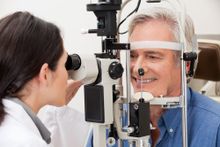Cincinnati Eye Doctors on How to Tell if You Have Glaucoma
By Wing Eyecare

Glaucoma is a general term for age-related eye diseases, including open-angle glaucoma and closed-angle glaucoma. Both diseases cause fluid blockages between the iris and the lens, leading to increased pressure on the optic nerve and eventual vision loss. Open-angle glaucoma is chronic, while closed-angle glaucoma is acute. Glaucoma can also affect people at birth or during early childhood, but it usually happens to older adults. Here, the eye doctors at Wing Eyecare in Cincinnati, OH, explain how to know if you have this disease.
How to Tell If You Have Glaucoma
Open-Angle Glaucoma
Open-angle glaucoma does not have obvious symptoms in its beginning stages. It develops in one or both eyes and usually goes unnoticed until serious vision loss occurs. Eye doctors will note side vision loss may happen prior to more severe vision issues. Vision loss is often unnoticeable until the later stages of the disease because the unaffected or less-affected eye makes up for the other. 
The only way to tell if you have open-angle glaucoma is through regular screenings with your eye doctors. Glaucoma screenings take little time and typically include several tests, including vision field tests, which check your peripheral vision, and tonometry, which measures the pressure within the eye. Other tests include those that measure your sight at assorted distances.
Closed-Angle Glaucoma
Closed-angle glaucoma may also stay symptom-free until the disease has progressed. However, it can include a range of symptoms such as serious pain in or around the eye, sudden and severe vision blurring, nausea and vomiting, eye redness, and colored halos around light fixtures. Symptoms may occur suddenly in the evening and cease the following morning.
Since closed-angle glaucoma may not feature symptoms, get tested each time you schedule a routine eye exam. Your eye doctor will recommend a testing schedule based on your current eye health and medical history.
Treatment Options
Glaucoma treatments include medicines, such as pills or eye drops, which are administered during the early stages of the disease. Some medicines help fluid drainage, while others prevent excess fluid production. Additional treatments include laser trabeculoplasty, which promotes healthy fluid drainage, and conventional surgery, which creates new openings in the eyes for efficient drainage. If you undergo surgery or trabeculectomy, you will need to use eye drops in the weeks following the procedure to prevent inflammation and infection.
Make glaucoma testing a routine part of your eye exams at Wing Eyecare. The eye doctors provide the comprehensive range of services you need, as well as prescription glasses and contact lenses from top brands. Call (888) 274-9464 today to schedule an appointment, or visit the website for additional information. Like the eye doctors on Facebook for professional eye care tips.
About the Business
Have a question? Ask the experts!
Send your question

